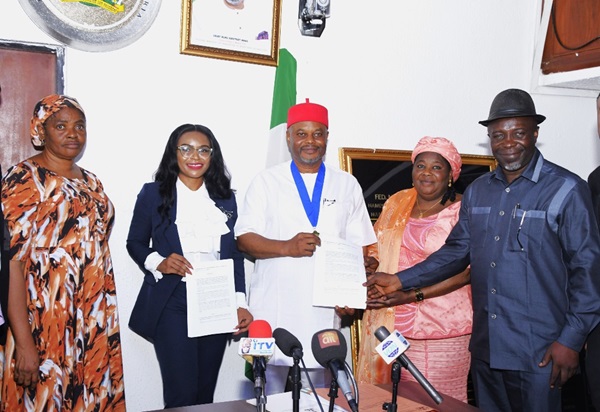Place your adverts here on InfoDig @ low rates; banner ads, sponsored links and guest articles etc. Contact us
The Federal Government, on Thursday, took delivery of one million doses of the R21/Matrix-M malaria vaccine donated by Gavi.
The handover ceremony took place in Abuja.
With the delivery, the commencement of the first phase of the introduction of the vaccine will be held in two states – Kebbi and Bayelsa, with a high prevalence of malaria by November.
The World Health Organisation, in December 2023, added the R21/Matrix-M malaria vaccine to its list of prequalified vaccines.
In October 2023, WHO recommended its use for the prevention of malaria in children, following the advice of the WHO Strategic Advisory Group of Experts on Immunisation and the Malaria Policy Advisory Group.
The prequalification means larger access to vaccines as a key tool to prevent malaria in children, this being a prerequisite for vaccine procurement by the United Nations Children Fund and funding support for deployment by Gavi, the Vaccine Alliance.
The R21 vaccine is the second malaria vaccine prequalified by the WHO, following the RTS, S/AS01 vaccine which obtained prequalification status in July 2022.
Both vaccines are shown to be safe and effective in clinical trials, for preventing malaria in children.
Speaking at the ceremony, the Executive Director and Chief Executive Officer of the National Primary Healthcare Development Agency, Dr Muyi Aina, said, “The arrival of the one million doses of the R21/Matrix-M vaccine from Gavi is a testament to President Bola Tinubu’s commitment to protecting the lives of our citizens, particularly, children.
“Nigeria is among the top 10 contributors to the global burden of malaria, accounting for approximately 27 per cent of the global burden and 31 per cent of malaria deaths worldwide.
“In 2022, nearly 200,000 deaths from malaria occurred in Nigeria. Children under five years of age, and pregnant women are the most affected, with a national malaria prevalence rate of 22 per cent in children aged six to 59 months as of 2021.
“The vaccine would quicken our malaria control and elimination efforts, as we expect about 13 per cent reduction in all-cause mortality in children under five and a 22 per cent reduction in hospitalized severe malaria cases.”
He added the commencement of the first phase of the introduction of the vaccine is in November, in two states – Kebbi and Bayelsa, with high prevalence of malaria.
“Kebbi because it has the highest prevalence rate in the country (52 per cent); while Bayelsa is selected because its target population of 69,935, and that of Kebbi’s 162,014, aligns with the one million doses available for this phase, thereby ensuring that the vaccine supply is effectively utilised.
“The vaccine will be administered to children aged five months to 15 months as part of routine immunisation.
“Each child requires four doses, given at five, six, seven, and 15 months of age, to be fully protected.
“The introduction will be expanded to other states and integrated into our national routine immunisation schedule, as we receive additional doses.
“The second phase will target 19 states and FCT, while the third phase will target the remaining 15 states. Both phases are scheduled for 2025,” he added.
Reacting, the President of NMA, Prof Audu Bala, said the doses donated were not enough but it was a good start.
“It’s definitely not adequate, but we didn’t have the vaccines before now, so this is a good starting point.
“However, there will be a need to sensitise people about the vaccine, and it will be good to prioritise the vulnerable group, especially the pregnant women, and children. But more than just talking, it will be an intervention in time.
“Also, we need to see what the uptake and the downfalls are and to know if people who are given these vaccines are developing the antibodies. So, we have to maximise the vaccine and the effectiveness.”
The NMA president reiterated that while the vaccine doses are limited, their arrival was a positive development.
He stressed the need for public education about the vaccine, prioritising vulnerable groups such as pregnant women and children.
He also emphasised the importance of monitoring vaccine uptake and effectiveness.
“I expect that the government will be able to make the decision on the place to deliver the vaccine.
“But first thing, before you enter a particular population, there should be a group that can guide you to that population, and there should be a group that conducts the design.
“Then, those that actually implement the vaccination are the second group, and the third group is those who do the intervention in time and ensure that the vaccine has the potential to enhance the vaccination,” he said.














 English (US) ·
English (US) ·